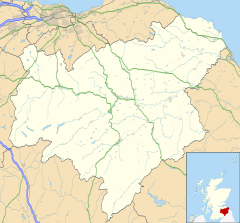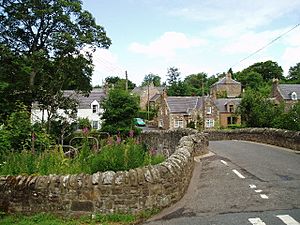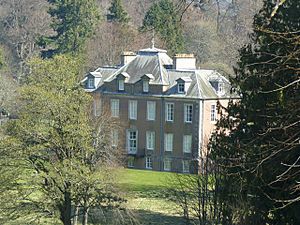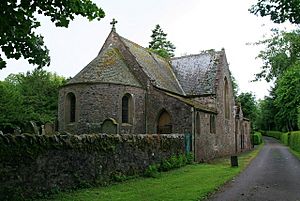Longformacus facts for kids
Quick facts for kids Longformacus |
|
|---|---|
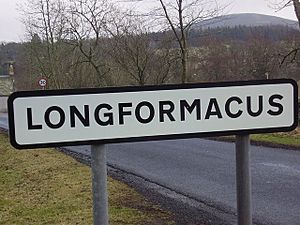 entering the village |
|
| OS grid reference | NT693572 |
| Council area | |
| Lieutenancy area | |
| Country | Scotland |
| Sovereign state | United Kingdom |
| Post town | DUNS |
| Postcode district | TD11 |
| Police | Lothian and Borders |
| Fire | Lothian and Borders |
| Ambulance | Scottish |
| EU Parliament | Scotland |
| UK Parliament |
|
| Scottish Parliament | |
Longformacus (which is Longphort Mhacais in Scottish Gaelic) is a small village in Berwickshire. This area is part of the Scottish Borders in Scotland. It is about 10 kilometers (6 miles) north-west of Duns. The village sits within the beautiful Lammermuir Hills. The Dye Water river flows right through the village. It then heads east to join the Whiteadder Water nearby.
Near Longformacus, you can find old remains of a fort at a place called Runklie or Wrinklaw. There is also an ancient stone mound known as the Mutiny Stones cairn.
Did you know that the famous opera Lucia di Lammermoor is set in the Lammermuir Hills? This opera was written by Gaetano Donizetti. It is based on a novel by Sir Walter Scott called The Bride of Lammermoor. An older name for the village, Lockermachus, is even mentioned in Scott's book!
Longformacus is also a great spot for walkers. The Southern Upland Way, a long walking path across southern Scotland, goes through the village. Another path, the Sir Walter Scott Way, also passes through Longformacus. This path stretches from Moffat to Cockburnspath.
What's in a Name?
The name Longformacus comes from the Scottish Gaelic words Longphort Mhacais. This means 'Macas's camp'. Another idea is that it comes from Lann Fothir Maccus. This would mean 'church on the land of Maccus'.
A Look Back in Time
The church in Longformacus has a long history. It was officially opened by Bishop David de Bernham on March 11, 1243. By 1667, parts of the church were falling apart. The church was rebuilt in 1730 using its original foundations. Later, in 1895, it was fully made new again.
There is also a special place called Our Lady's Well. It is located by the Dye Water, about a quarter of a mile east of the village. For a long time, Longformacus was joined with another parish called Mordington. But they separated in 1666. Then, in 1712, Longformacus and Ellem were joined together. The church in Ellem was no longer used after that.
At one point, there was some copper ore found in the area. A minister who lived there even tried to melt it down. However, mining copper on a large scale was not successful.
Famous Faces from Longformacus
Some interesting people have connections to Longformacus:
- Prof Alexander Christison FRSE: He was a professor.
- Thomas Ord: He was a circus horseman. His father was the minister of Longformacus.
 | Aurelia Browder |
 | Nannie Helen Burroughs |
 | Michelle Alexander |


